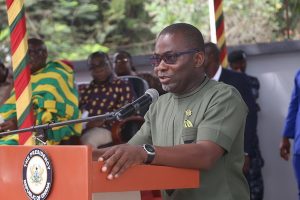The President Nana Akufo Addo has charged the Lands Commission to expedite action on digitization process of land acquisition.
Akufo Addo made this known on Wednesday, when he addressed the maiden National Land Conference, organized by the Ministry of Lands and Natural Resources.
Akufo-Addo stated that in this technologically advanced age, it is unacceptable that many sectors of the economy still operate in a largely manual environment.
“We cannot deliver an efficient land administration, if documents on land have to be processed manually. We must, therefore, expedite action on the digitalisation process, and ensure that the Commission goes fully digital. As you go into technical discussions, it is my hope that this will be key on your agenda’’, he said.
Reiterating the significance of land to socio-economic development of the country, the President noted that a rapidly growing population, coupled with competing uses of land, continue to put immense pressure on our land resources.
According to the President, it is for this reason that, “during the first term of my presidency, we prioritized the passage of the Land Bill, which had been in the draft stage for some twenty (20) years.”
The Land Act, 2020 (Act 1036), which he assented to on 23rd December 2020, the President explained, “revises, harmonizes and consolidates laws on land to ensure sustainable land administration and management, as well as effective and efficient land tenure systems.”
Successive Governments have sought, through numerous initiatives, to improve Ghana’s land administration regime. The most significant intervention has been the Land Administration Project (LAP), Phases 1 and 2, which sought to lay the foundation, and consolidate urban and rural land administration and management systems for efficient and transparent land service delivery.
These interventions have yielded some results, such as the reform of the Lands Commission through the enactment of the Lands Commission Act, 2008 (Act 767), the establishment of five (5) Client Service Access Units (CSAUs) at the Lands Commission to enhance service delivery, the establishment of Customary Land Secretariats, reforms in the Judiciary through the establishment of specialised land courts and the automation of some courts, the enactment of the Land Use and Spatial Planning Act, 2016 (Act 925), the introduction of a new three-tier Spatial Planning Model, and the development of a National Spatial Development Framework and two (2) Regional Spatial Development Frameworks.
“But laws, in themselves, do not resolve problems. It is their application and effective implementation that yield the requisite results. That is why this conference, which brings together diverse people from different sectors to deliberate on the nexus between land and socio-economic development, is so crucial”, he emphasized.
The President continued, “Fortunately, the Land Act, 2020 (Act 1036), provides a strong foundation for fashioning out a workable and efficient land administration. The Act has far-reaching provisions which, if implemented, will go a long way to build the effective land administration we desire’.’
Key amongst them, he said, is the establishment of Customary Land Secretariats to see to the management of stool, skin, family and clan lands, restrictions on large scale disposal of family and clans lands without the concurrence of the Regional Lands Commission, the power of the Regional Commission to survey and demarcate land, the provision for electronic conveyancing, the detailed provisions for the compulsory acquisition of land including the payment of compensation, the management and use of public lands, and the provisions for divesting of vested lands.
The Act “also addresses the challenges associated with boundary demarcation, and clarifies rights and interests in land, and persons with capacity to alienate land. It provides stringent jail terms for various offences related to land, such as landguardism, falsification of records and fraudulent transactions in land administration”.







